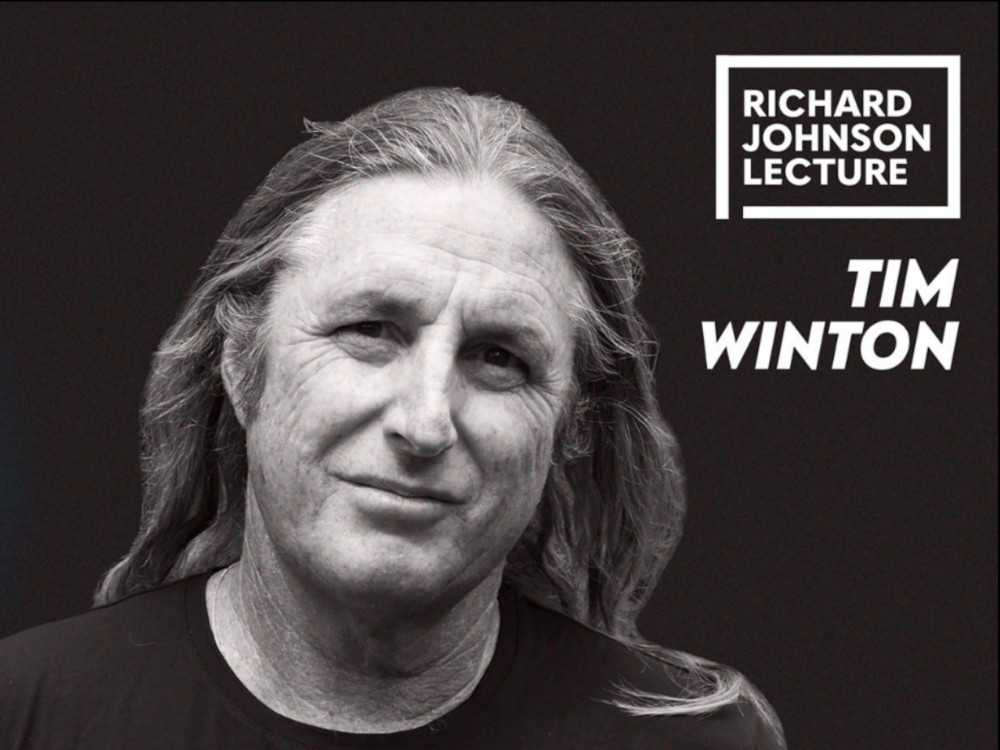“Why write love poetry in a burning world?” Tim Winton began his Richard Johnson lecture in Sydney this week. The lecture presented by the Centre for Public Christianity (CPX) sold out the Concourse Concert Hall in Chatswood. Winton quoted the American poet Katie Farris. She answered, “To train myself, in the midst of a burning world, to offer poems of love to a burning world.” Winton’s lecture was a speech of love to a burning world, one that is threatened by climate change.
The full lecture will be made available by CPX, and readers should follow their socials to obtain it.
Here is a taster.
Expanding on a “toxic positivity” of late capitalism that has cut human beings off from nature, Winton references two “Normans,” the first of which implicates Christians and the second a metaphor for the destruction of nature.
“Well, our culture became infected with toxic positivity. It’s a denial of authentic emotion. It’s something without illumination, it’s a devotion to vacuous optimism and it’s really painful to acknowledge this, that toxic positivity got Christian fingerprints all over it – particularly protestant fingerprints. The Power of Positive Thinking was published in 1952 by the Reverend Norman Vincent Peale, presented as an expression of faith. It was, in truth, a hymn to capital’s progress, the belief system that emphasises becoming over being, as Parmenides describes it. It’s a process defined by continuous movement with no fixed direction and no terminus or, as I less charitably call it, one big smiley, optimistic, unreflective machine eating the world and its people without letting up and without context.
“Norman Vincent Peale, by the way, invented the personal brand. There’s no surprise that Trump should claim him as his pastor and inspiration. Part of the evil genius in social media platforms is, of course, an addictive algorithm. But the enabler of all that narcissism and misery is Peale. All beauty, no terror, no vulnerability, no failure, no suffering, all self-projection. It’s all becoming your perfectly curated self.
Now, I, too, remember another Norman, Norman Lindsay’s book, The Magic Pudding. It’s a kid’s story, apparently, but it’s also an uncanny description of the way that we live on this continent in a state of magical thinking that assumes that land, waters and atmosphere are not only profane but inexhaustible. So there’s nothing to venerate here but our own genius at seizure and exploitation, nothing to fear from the ocean because, of course, we are its owners and masters. The only terror we admit to is the fear of missing out on grasping more.
“But here’s the thing: our mighty suffering continent is confounding our infantile conceptions. Our sense of mastery has been exposed as prideful delusion. The creation that we thought we conquered is simply refusing to comply. Our regime of capture and intensification hasn’t made the world safer for us.
“Quite the contrary, and now adding insult to injury, we find heretics. We find folks in our community who don’t believe that our pudding is magic after all. Basically, to say that our bites and slices and gouges leave holes – that our pie is falling apart, that it might be leaving less, less for life itself.”
“Well, they are troublesome folks, these non-believers. Obviously, they can’t read the catechism because they see no in consumption. I hear a lot of grumbling around the decline of religious observance in our day, but there is very scant acknowledgement of the dominant religion of our time and how very devout we are and devoted to this cult which sees virtue in what every other faith tradition holds as vipers: selfishness, greed, contempt for the weak and indifference to the suffering.”
CPX website is publicchristianity.org
Facebook https://www.facebook.com/publicchristianity

